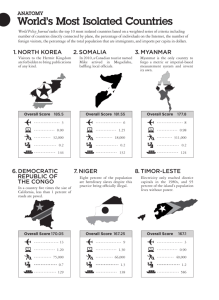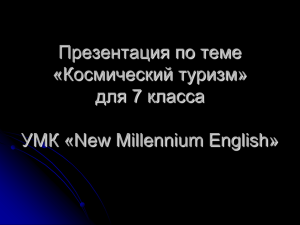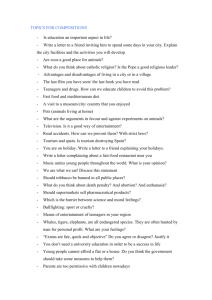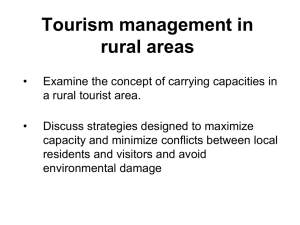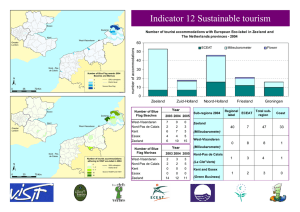journey/trip/flight/voyage/crossing/drive/ride/tour
advertisement
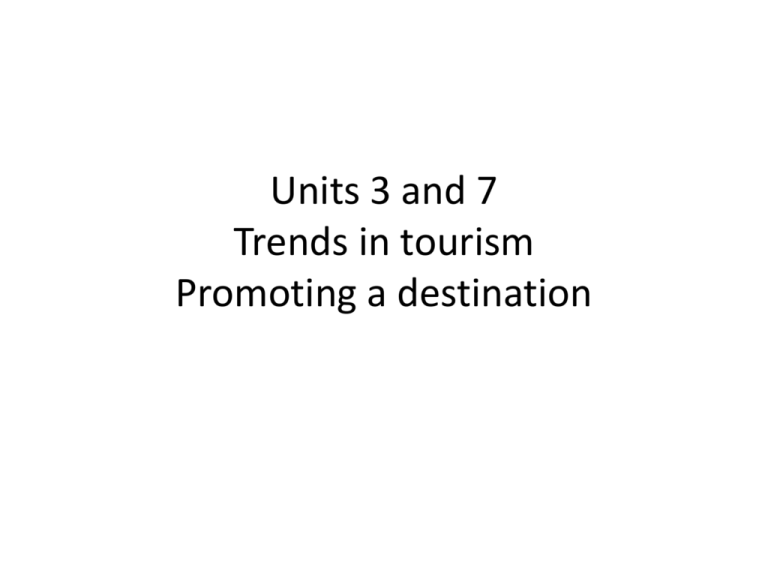
Units 3 and 7 Trends in tourism Promoting a destination • What do you think is the difference between a traveller, a visitor and a tourist? Write brief definitions of each word. A tourist describes someone who has taken a holiday to visit a different place from their home. A traveller travels, usually for a longer period than a tourist, in order to learn more about a different culture. In everyday language the word visitor is not strongly associated with tourism at all. Vocabulary journey/trip/flight/voyage/crossing/drive/ride/tour • If you' re visiting Madrid. why not go on a day to Toledo? • The ..... was delayed because of air traffic congestion over Heathrow . • The.. . on the ferry was very rough. • The train ... . from Madras to Bangalore was uncomfortable. • The Titanic sank on its maiden ……… • Why not hire a car and go for a ... . in the country? • There's a volleyball team on ...... and they want hotel accommodation. • The museum is a short bus .... .. from the tourist information office. Speaking a What was your local area like fifty years ago? b Was it attractive to tourists? c What changes have there been since then? d How have these changes affected tourism? Speaking Work in groups of four. You are going to give short talks on tourism development in two different countries. • Read the Ireland fact file below. • Discuss tourism in Ireland. • Team A look at the information on Ireland. • Team B look at the information on Egypt on page 104. Tourism to Spain goes back to t he 1930s, but package tourism really (take off) ...... in Spain during the late 1950s and 1960s. The post-war economic and population growth plus the increase in leisure time and disposable income in Northern Europe (coincide) .. " .. with Spain's policy to "welcome tourism , offering a reliable climate, beaches. a different culture and low prices. The favorable exchange rate and competitive cost of living (be) ...... additional incentives. Mass tourism (begin) .... . . towards the end of the 1970s but the familiarity with Spain and falling standards (lead) ...... to a poor image of the country as a holiday destination . As a result, Spain (face) ...... competition in the late 1980s from other Mediterranean and long-haul destinations. At that time competitive airfares across the Atlantic to Florida and the low cost of living in America (mean) .. .... that many people (prefer) ...... to go to the States rather than holiday in the Iberian peninsula. Even so, in 1993 Spain (welcome) .. .... over 57 million visitors 8 per cent of GNP - and (account for) ...... 24 per cent of all Britain's outbound tourism. The Spanish tourism industry (make) .. .... many mistakes in the early years with the building of high rise hotels and poor town planning. However. the situation is changing. Over the last few years the government (restrict) ...... building and is providing grants for organizations and t raining in the tourist sector. In addition, it (implement) . .... . a n investment programe to modernize public service facilities and infrastructure and to protect the environment. And with the help of soft loans which the government (make) available for refurbishments. many hoteliers (improve) ...... The standard of accommodation provided in order to meet the new stricter guidelines. Past Simple FORM [VERB+ed] or irregular verbs Examples: • You called Debbie. • Did you call Debbie? • You did not call Debbie. USE Completed Action in the Past • Last year, I traveled to Japan. • I saw a movie yesterday. • I lived in Brazil for two years Present Perfect FORM [has/have + past participle] Examples: • You have seen that movie many times. • Have you seen that movie many times? • You have not seen that movie many times. USE • the present result of something that happened at an unspecified time in the past • actions which started in the past and continue in the present Past Simple vs. Present Perfect • Which tense has a connection with the present? • Which tense only tells about the past • Past Simple: yesterday, last week (year, month), two years ago, in 1999 • Present Perfect: just, for, since, ever, never, lately, so far, up to now Complete the dialogues. Put the verbs into the past simple or the present perfect. 1 A :............................ (you/ever/be) to Singapore? B: Yes - in fact I ........................... (live) there for two years, from 1997 to 1999. 2 A: I ........................... (not/receive) your report yesterday could I see it now? B: I'm sorry, but I don't know where it is – I ........................... (lose) it. 3 A: I can't find Mrs. Langer - ........................... (she/go) to lunch? B: Yes, she .......................... (leave) about 10 minutes ago. 4 A :............................ (John/send) you those figures yet? B: Yes, he .............................. (email) them to me last night. 5 A: How many units...........................(we/sell) last year? B: 8,500 - and so far this year w e ........................... (sell) over 10,000 and it's only May. Taking notes Listen to Christopher Keoh talking about recent developments in Singapore. Take notes under these headings: • ORIGINS OF TOURISM IN SINGAPORE • NUMBER OF TOURISTS • AVERAGE LENGTH OF STAY • BREAKDOWN OF ARRIVALS Exam Questions a Why do people come to your country? b What do they do when they are there? c Is it the perfect place to come to or are there some disadvantages? d Why do you think people want to visit Britain? e What do you think are the negative features of Britain? • Think of the strengths and weaknesses of your own country as a tourist destination and produce a similar table for it. Exam Question • Does your country have a government organization which is responsible for the development of tourism? If so, what does it do? Listen to Ann Trevor talking about the way the Barbados Tourist Authority promotes the Caribbean island within the trade and answer these questions. a What is the Barbados Tourist Authority's marketing strategy for Barbados? b What does Ann do at trade fairs? c How does the BTA work with tour operators? d Why does she mention Almond Beach Village? Is her work the same as the work of the tourist authority in your country? Making a presentation You have recently returned from a familiarization trip to a holiday resort and now have to report back on your visit. Decide which resort you went to and which tour operator paid for your holiday. Prepare a presentation. Talk about the resort itself and also about those facilities offered by the tour operator. Include the following: - TRANSPORT TO AN D FROM THE RESORT - THE CLIMATE - THE ACCOMMODATION -THE LOCAL ATTRACTIONS -THE FOOD - TRANSPORT IN THE RESORT - THE PRICE AND VALUE FOR MONEY - THE KEY SELLING POINTS The language of presentations Introduction • Good evening, everyone. • Thank you for inviting me to speak on . • Tonight I am going to talk about Introducing your talk • I would like to start by . • I shall begin by . • Then I will speak about. • Thirdly I will talk about ... • And lastly. •The main part of the talk • Let us begin with ... • However. • As far as (the accommodation) is concerned. • Moving on to . • My third point deals with . • And last but not least ... Summing up/ conclusion • 50, in conclusion, you can see that. • Saying thank you and ending your talk • Thank you all for listening so attentively. • I hope I have been able to tell you a little about . • Before I sit down I would first like to thank ... for ... • Does anyone have any questions?

